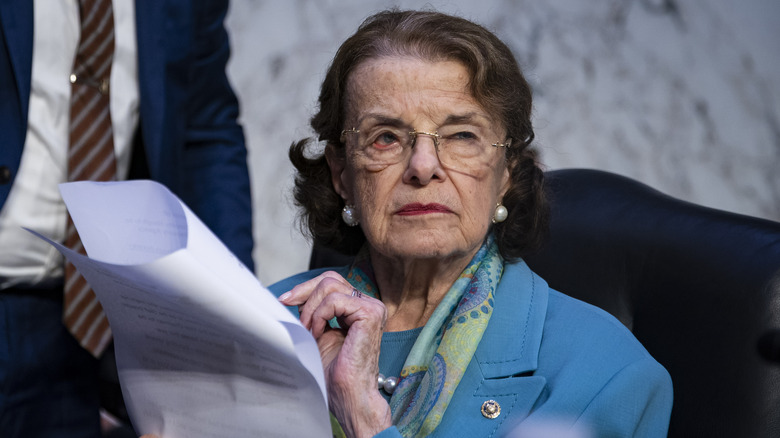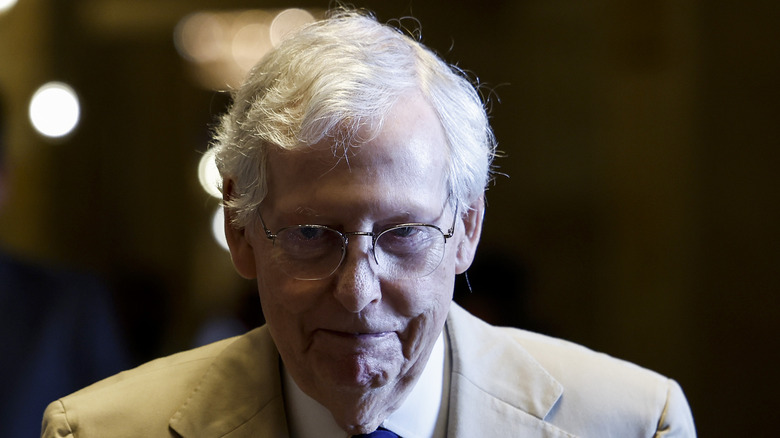What Happens If A Senator Becomes Unfit To Hold Office Due To Medical Reasons?
In 2023, two United States senators — Republican Mitch McConnell from Kentucky and Democrat Dianne Feinstein from California — displayed public behaviors that lead some to wonder if they were unwell and unfit for office. McConnell and Feinstein's apparent and possibly age-related health issues raised the question: What — if anything — can Congress do if a senator becomes unable to perform their duty?
According to Politico, the framers of the Constitution offered no contingency plan for such a situation, leaving few options for members of Congress concerned for the wellbeing of their colleagues beyond requesting or pressuring them to resign; waiting for them to choose to do so on their own; or biding their time until the next election, hoping the lawmaker might choose not to run or lose. What's more, a constitutional amendment would be required to create a mechanism for the Senate to expel a member for medical reasons, and that's no easy task, per The White House.
Bipartisan Policy Center says several senators throughout history have faced health challenges while in their post, some resulting in years-long absences, but none were removed from office as Congress simply has no power to do so. In certain circumstances, ad hoc arrangements were made to help senators fulfill their duties, according to NPR. But FiscalNote reports that as of 2023, the average senator was 64 years old, so age and accompanying health problems will likely become an even more pressing matter in the future.
Removing a politician from office should be tricky
Despite possible performance problems related to health, the process of removing any democratically-elected politician should be difficult and carefully considered — and old age should not be the sole deciding factor. Senators can be expelled for reasons outlined later on, but to declare a senator incapacitated for medical reasons or old age is a sensitive issue. No one ages at the same rate or in the same way, nor is it politically prudent to telegraph the message to an older electorate their representation doesn't matter, among other challenges, Politico points out.
Should a senator choose to quit, die in office, or be expelled, what happens next varies by state. Per the 17th Amendment, the governor of the state appoints a successor — sometimes from the same party — either until the next election or until a special election takes place. As for the presidency, President Joe Biden will be the oldest president ever to seek reelection, making age a factor in the White House as well. However, the 25th Amendment of the Constitution lays the framework for how a president might be removed should they become unfit for office — and how the position would be filled in the aftermath.
The balance of power and senate expulsion
The Oval Office aside, senators can be removed from office for corruption or misbehavior with a two-thirds vote, as mentioned, but even that has rarely happened. In United States history only 15 senators have been expelled, and most were expelled for supporting the Confederacy in the Civil War. In other disciplinary action, senators otherwise resigned on their own, their term expired, or they were allowed to keep their seats.
Crucially, the congressional balance of power can also be greatly affected by a senator's removal for any reason. For example, Minority Leader Mitch McConnell's absence could create a "power vacuum," Vox writes. Meanwhile, with Democrats' slim congressional majority as of 2023, similar considerations will be in play should Dianne Feinstein choose or be forced to step down — although California Governor Gavin Newsom would likely appoint a Democrat as her successor, per The Hill.
As of February 2023, Feinstein — who was 90 at the time — announced she would not seek reelection at the conclusion of her term after episodes of poor health, according to NBC News. After two high-profile incidents of seemingly freezing and being unable to speak at a press conference — among other signs of illness — McConnell, 81, said he would remain Senate minority leader until the conclusion of his current term in 2024. However, he failed to address whether he would seek reelection, CNN reported in August 2023.


